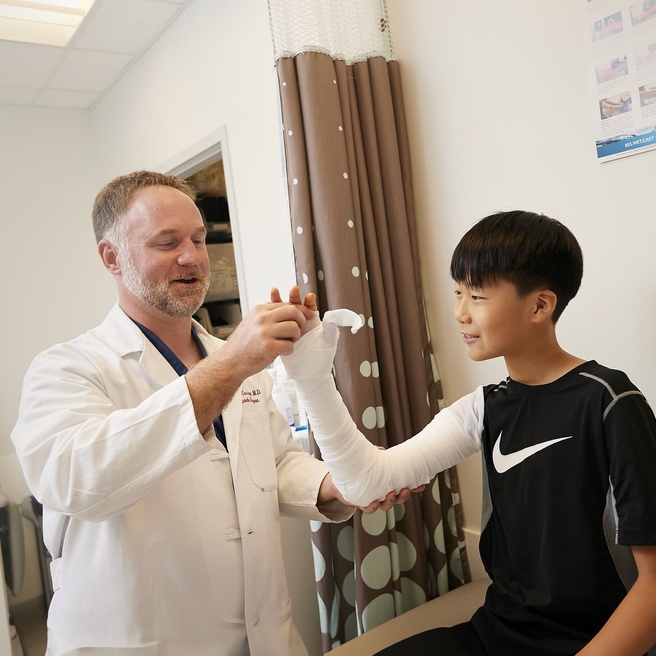What is femoral anteversion?
Femoral anteversion is an inward twisting of the thigh bone, also known as the femur (the bone that is located between the hip and the knee). Femoral anteversion causes the child's knees and feet to turn inward, or have what is also known as a "pigeon-toed" appearance. It is typically detected when the child is 4 years to 6 years old. Intoeing is also often noticed by parents when their child begins to walk, but it may be present in different aged children for different reasons.
What causes femoral anteversion?
Femoral anteversion can be the result of stiff hip muscles due to the position of the baby in the uterus. It also has a tendency to run in families. Typically, a child's walking style looks like that of his or her parents.
When the child is first learning how to walk, femoral anteversion can create an intoeing appearance. As the knees and feet turn in, the legs look like they are bowed. The bowed leg stance actually helps the child achieve greater balance as they stand. Balance is not as steady when they try to stand and walk with their feet close together or with their feet turned out. This may cause them to trip and fall.
How is femoral anteversion diagnosed?
The diagnosis of femoral anteversion is made by a history and physical examination by your child's doctor. During the examination, the doctor obtains a complete prenatal and birth history of the child and asks if other family members are known to have femoral anteversion. Generally, no X-rays are necessary.
Treatment for femoral anteversion
Specific treatment for femoral anteversion will be determined by your child's doctor based on:
- Your child's age, overall health, and medical history
- The extent of the condition
- Your child's tolerance for specific medications, procedures, or therapies
- Expectations for the course of the condition
- Your opinion or preference
The twisting in of the thigh bone usually improves with time. As the child grows, normal walking patterns typically resume by 8 years to 10 years of age.
Occasionally braces or special shoes are prescribed by the doctor, but most studies have not found these treatments to help.
Long-term outlook for a child with femoral anteversion
Femoral anteversion has a very good prognosis. Many cases correct themselves as the child grows. On rare occasions, femoral anteversion can be severe and surgery may be required to straighten the thigh bone.
It is important to know that femoral anteversion typically does not lead to arthritis or any other future health problems.

Why choose CHOP
CHOP's Orthopedic Center is one of the largest and most active pediatric orthopedic centers in the world, consistently ranked among the best in the nation by U.S. News & World Report.
Resources to help
Orthopedic Center Resources
We have created resources to help you find answers to your questions and feel more confident in the care you are providing your child.
